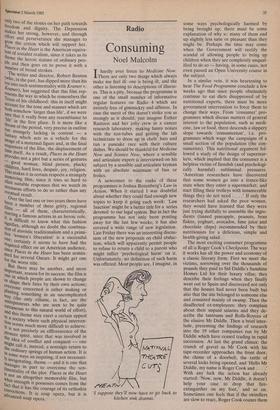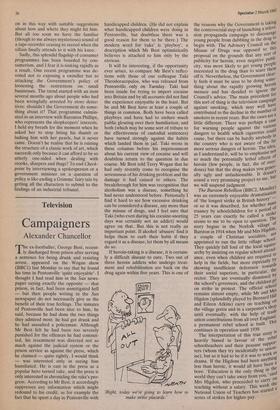Radio
Consuming
Noel Malcolm
T hardly ever listen to Medicine Now. IThere are only two things which always make me feel ill: one is being ill, and the other is listening to descriptions of illness- es. This is a pity, because the programme is one of the small number of informative regular features on Radio 4 which are entirely free of gimmickry and silliness. In case the merit of this doesn't strike you as strongly as it should, just imagine Esther Rantzen and her jolly crew in a cancer research laboratory, making funny noises with the test-tubes and getting the lab technicians to dress up in chefs' hats and run a pancake race with their culture dishes. We should be thankful for Medicine Now and Science Now, where a sensible and articulate expert is interviewed on his subject by a sensible and articulate layman with an absolute minimum of fuss or frolics.
A newcomer to the ranks of these programmes is Joshua Rozenberg's Law in Action. When it started I was doubtful about whether they could find enough new topics to keep it going each week: 'Law Inaction' might be a better title for a series devoted to our legal system. But in fact the programme has not only been ponting away for the last few weeks; it has also covered a wide range of new legislation. Last Friday there was an interesting discus- sion of the new proposals on child abduc- tion, which will apparently permit people to refuse to return a child to a parent who might inflict 'psychological harm' on it. Unfortunately, no definition of such harm was offered. Most people are, I imagine, in 'I suppose they'll now have to go back t kitchen sink dramas.' some ways psychologically harmed by being brought up; there must be some explanation of why se many of them end up slightly less sane or pleasant than they might be. Perhaps the time may come when the Government will rectify the scandal of allowing people to bring up children when they are completely unqual- ified to do so — having, in some cases, not even passed an Open University course in the subject.
In a similar vein, it was heartening to hear The Food Programme conclude a few weeks ago that since people obstinately continue to eat diets disapproved of by nutritional experts, there must be more government intervention to force them to change their ways. From 'consumer' pro- grammes which discuss matters of general interest to the population, such as medi- cine, law or food, there descends a slippery slope towards 'consumerism', i.e. pro- grammes which wage the campaigns of a small section of the population (the con- sumerists). This nutritional argument fol- lowed a study of the design of supermar- kets, which implied that the consumer is a helpless victim of fiendish (and psychologi- cally harmful) subliminal pressures. 'American researchers have discovered that some women go into a trance-like state when they enter a supermarket, and start filling their trolleys with innumerable things they do not need . . . If only the researchers had asked the poor women, they would have learned that they were just trying dutifully to assemble the ingre- dients (tinned pineapple, peanuts, bran flakes, yoghurt, avocados, lime juice and chocolate chips) recommended by their nutritionists for a delicious, simple and health-giving salad.
The most exciting consumer programme of all is Roger Cook's Checkpoint. The way it works has all the power and economy of a classic literary form. First we meet the victims, sorrowing over the thousands of pounds they paid to Sid Diddle's Sunshine Homes Ltd for their luxury villas; they describe their feelings when they finally went out to Spain and discovered not only that the houses had never been built but also that the site belonged to someone else and consisted mainly of swamp. Then the disaffected ex-employees: they complain about their unpaid salaries and they de- scribe the tantrums and Rolls-Royces of the elusive Mr Diddle. Then a brief inter- lude, presenting the findings of research into the 19 other companies run by Mr Diddle which have ceased trading in rapid succession. At last the grand climax: the crunch of gravel as Mr Cook with his tape-recorder approaches the front door, the chime of a doorbell, the rattle of several locks being opened, and 'Hello Mr Diddle, my name is Roger Cook and. . .
With any luck the action has already started: Now, now, Mr Diddle, it doesn't help your case to drop that fire- extinguisher on my foot,' and so on. Sometimes one feels that if the swindlers are slow to react, Roger Cook coaxes them on in this way with suitable suggestions about how and where they might hit him. But all too soon we have the familiar (though to me always mysterious) sound of a tape-recorder ceasing to record when the villain finally attends to it with his knee.
Sadly, this splendid flagship of consumer programmes has been boarded by con- sumerism, and I fear it is sinking rapidly as a result. One recent programme was de- voted not to exposing a swindler but to attacking the Government's policy of loosening the restrictions on small businesses. The trend started with an item several months ago about people who had been wrongfully arrested by store detec- tives: shouldn't the Government do some- thing about it? That programme culmin- ated in an interview with Baroness Phillips, who represents the shopkeepers' interests. I held my breath for the moment when he asked her to stop biting his thumb or lashing him with her pearls, but it never came. Doesn't he realise that he is ruining the structure of a classic work of art, which succeeds only because it can afford to be so utterly one-sided when dealing with crooks, sharpers and thugs? To end Check- point by interviewing a spokesperson or a government minister on a question of policy is like ending a Grimms' fairy tale by getting all the characters to submit to the findings of an industrial tribunal.















































 Previous page
Previous page